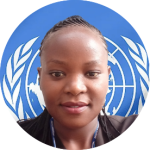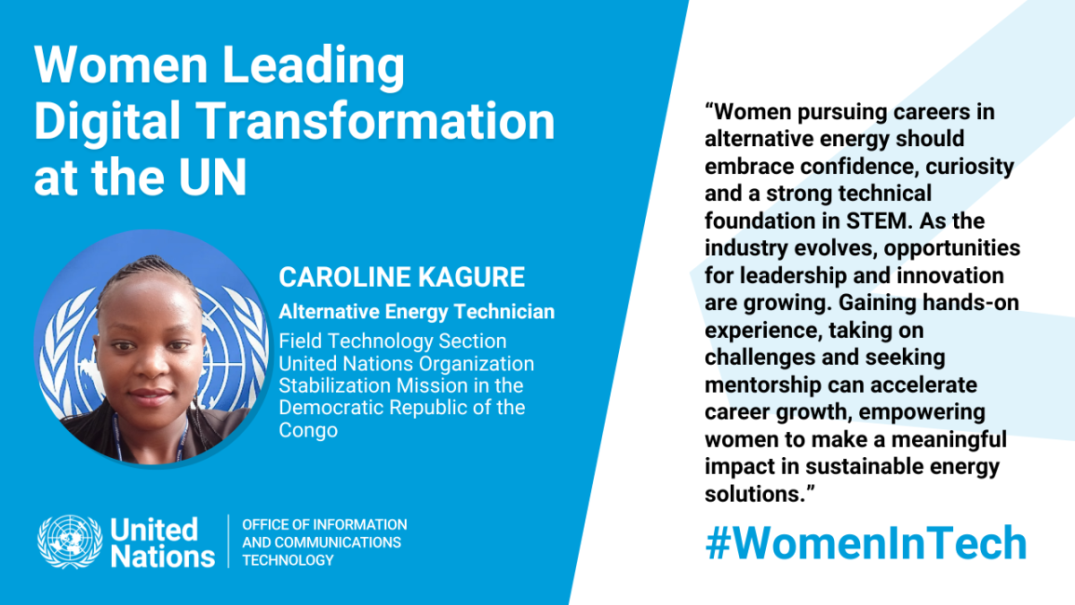Read about Caroline Kagure


Caroline Kagure
Alternative Energy Technician
Field Technology Section, United Nations Organization Stabilization Mission in the Democratic Republic of the Congo
What brought you to a career in technology at the United Nations?
My journey into a career at the United Nations was fueled by a deep-rooted passion for sustainable innovation in the alternative energy sector. With a diploma in Avionics/Power option, I developed a strong technical foundation that allowed me to explore renewable and alternative energy solutions within various United Nations setups. Recognizing the critical need for stable power in mission-critical environments, I was inspired to contribute to energy sustainability efforts that drive global initiatives forward. Entering a field traditionally dominated by men, I saw an opportunity not just to advance technical solutions but also to pave the way for greater inclusivity in the energy sector.
The intersection of renewable energy and cutting-edge information technology fascinated me early in my career. I realized that by integrating smart technology with energy solutions, we could enhance efficiency, reduce environmental impact, and create more reliable power infrastructures to support global operations. This vision led me to explore innovative approaches to merging IT with sustainable energy practices, ensuring that alternative energy sources meet the growing demands of high-stakes environments. By leveraging data-driven solutions and automation, I strive to make energy systems more resilient, cost-effective, and environmentally friendly.
As a woman in a male-dominated industry, I am driven to challenge existing norms and foster inclusivity within the energy and technology sectors. My role as an Alternative Energy Technician highlights the vital importance of stable power in sustaining global missions while proving that women can thrive in highly technical and demanding fields. In this capacity, I am responsible for the routine maintenance, monitoring, and installation of stable power backups across various critical equipment rooms within UN setups. Ensuring reliable energy infrastructure is crucial to the seamless operation of mission-critical systems, reinforcing my commitment to excellence in this essential field.
Beyond my technical responsibilities, I actively promote diversity and advocate for greater representation of women in renewable energy. By encouraging more women to pursue careers in Science, Technology, Engineering, and Mathematics (STEM), I hope to inspire the next generation of female leaders who will shape the future of sustainable energy. Representation matters, and I am committed to breaking barriers and making the energy sector more accessible to all.
Recognizing the pivotal role of technology in addressing global energy challenges, I remain committed to developing innovative solutions that enhance energy stability while promoting environmental sustainability. My experiences have reinforced the idea that combining diverse expertise with a strong commitment to progress can create a lasting impact. By continuing to merge my passion for alternative energy with advancements in technology, I hope to contribute meaningfully to the UN’s mission, ensuring that stable power remains a cornerstone of effective global operations. My journey is not just about technical expertise but about driving meaningful change in an evolving world.
What has been your favorite technology project or initiative at the United Nations and why? What was your contribution?
Among the many alternative energy and stable power projects I have been part of with the United Nations Alternative Energy Team, one of my most rewarding experiences was working on the UPS and solar power backup initiative, including grounding systems for critical UN mission main data centers and equipment rooms. This project was designed to enhance energy resilience by integrating renewable energy sources into the existing power infrastructure, reducing reliance on diesel generators, and ensuring an uninterrupted power supply in remote and high-risk locations. The initiative was particularly significant as it aligned with the UN’s sustainability goals while addressing the urgent need for stable power in mission-critical environments.
My passion for this project stemmed from its ability to provide sustainable, cost-effective, and environmentally friendly energy solutions. Many UN field operations occur in regions where power grids are unreliable or nonexistent, making energy security a top priority. By incorporating solar energy storage systems, we were able to significantly reduce operational disruptions, lower carbon footprints, and cut fuel costs. This project not only improved efficiency in UN operations but also set an example for sustainable energy adoption in global peacekeeping missions.
My primary contribution to the project involved the installation, maintenance, and monitoring of the power backup systems. I was responsible for ensuring that the solar panels, battery storage units, and inverters were optimally integrated to provide stable energy output. Additionally, I worked closely with engineers and IT specialists to implement smart monitoring technologies that allowed real-time tracking of energy consumption and system performance. These efforts enhanced reliability, ensuring that critical equipment, such as communication systems, medical facilities, and security infrastructure, always remained operational.
Beyond the technical aspects, I also played a role in training personnel on system operations and maintenance. Knowledge transfer is key to the long-term success of any sustainable energy initiative, and I was deeply committed to empowering UN staff and local technicians with the skills needed to manage and troubleshoot the systems independently. By fostering technical expertise at the ground level, we ensured the sustainability and scalability of the initiative, making it a long-term energy solution rather than a short-term fix.
This project reinforced my belief in the transformative power of renewable alternative energy in UN mission-critical operations. It also highlighted the importance of diverse expertise and inclusive participation in the energy sector. As a woman in a male-dominated field, I took pride in demonstrating that technical excellence and leadership transcend gender barriers. By contributing to a project that had both environmental and operational impact, I reaffirmed my commitment to driving sustainable energy solutions within the UN and beyond. Looking ahead, I remain dedicated to advancing renewable energy innovations that not only enhance operational efficiency but also contribute to global sustainability and resilience.
What advice would you give women interested in pursuing a field in technology?
Women pursuing careers in alternative energy should embrace confidence, curiosity, and a strong technical foundation in STEM. As the industry evolves, opportunities for leadership and innovation are growing. Gaining hands-on experience, taking on challenges, and seeking mentorship can accelerate career growth, empowering women to make a meaningful impact in sustainable energy solutions.


